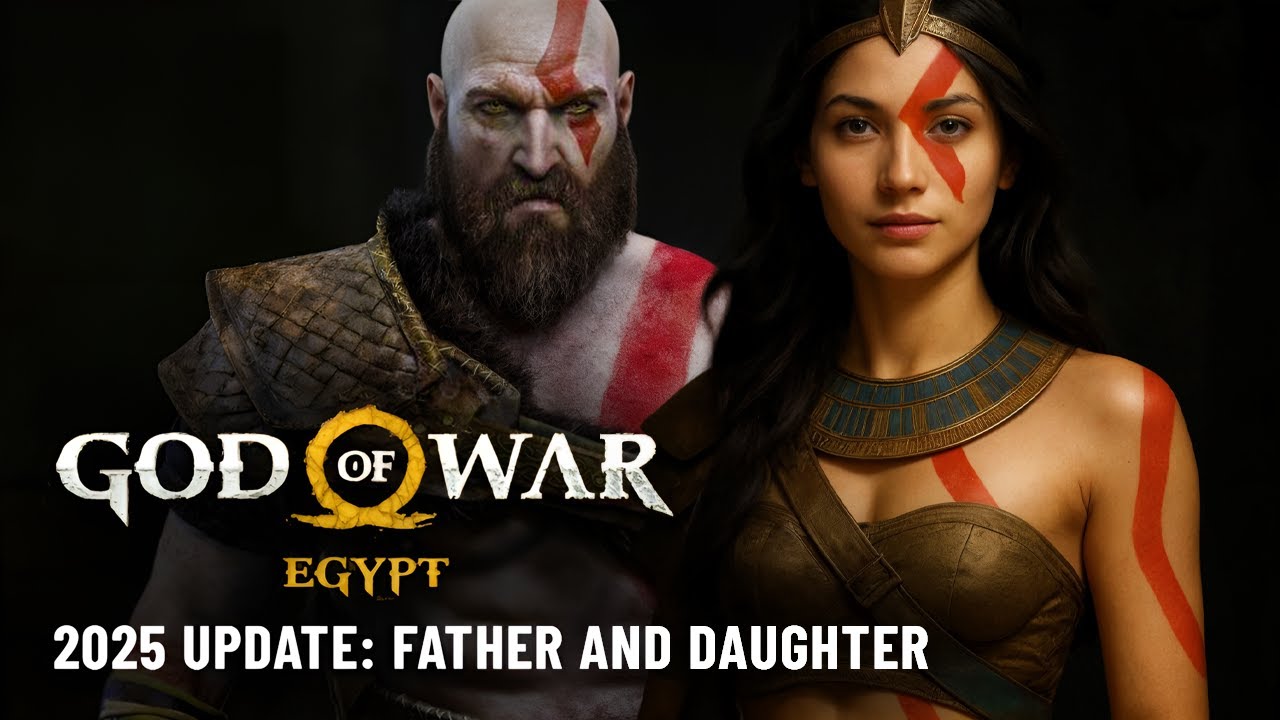Kratos Faces His Past in Egypt?!
What if Kratos’ long-lost daughter, Calliope, is alive in the sands of Ancient Egypt, wielding powers that could rival her father’s? 🌪️⚔️ Rumors are igniting about the next God of War—new gods, dark secrets, and a reunion that could shatter Kratos’ heart. Is this truth or divine trickery? 🤔
Uncover the wildest theories and leaks now! 👉

The God of War franchise, developed by Santa Monica Studio, has redefined action-adventure gaming with its visceral combat, rich storytelling, and Kratos’ evolution from a vengeance-driven Spartan to a reflective father. After concluding the Norse saga with God of War Ragnarök (2022) and its Valhalla DLC, fans are buzzing with speculation about the series’ next chapter. Rumors point to Ancient Egypt as the new setting, with whispers of Kratos’ daughter, Calliope, making a dramatic return. Could she be alive, wielding Egyptian magic? Or is this another divine illusion? This article delves into the rumors, explores the mythological connections, and unpacks fan theories about what a God of War set in Egypt might hold.
The Rumor: Calliope’s Return in Egypt
Kratos’ tragic past is central to his character. In the Greek era of God of War, he was tricked by Ares into killing his wife, Lysandra, and their daughter, Calliope, earning him the moniker “Ghost of Sparta.” Calliope, introduced in God of War: Chains of Olympus and explored further in the 2010–2011 comic series, was a beacon of hope for Kratos. Stricken with plague at birth, Kratos saved her by retrieving the Ambrosia of Asclepius, only to lose her later to Ares’ manipulation. Her death haunts Kratos, and her brief appearance in the Elysian Fields in Chains of Olympus underscored his enduring grief.
Recent rumors, reported by outlets like NoobFeed, suggest that Calliope may not be gone forever. According to leaks, she was “transferred to Egypt” after her birth in Greece, where she forged her own path, potentially growing into a 20-year-old warrior with a fighting spirit akin to Kratos’. The theory posits that after Ragnarök, Kratos learns of her survival and journeys to Egypt to find her, only to face opposition from powerful Egyptian gods like Anubis, Set, and Ra. This narrative would introduce a deeply personal stakes for Kratos, contrasting with the father-son dynamic of Atreus in the Norse saga.
However, a darker theory suggests Calliope’s return could be an illusion. Egyptian mythology is rich with themes of deception, curses, and divine manipulation. Fans on Reddit and YouTube speculate that gods like Set, the deity of chaos, could conjure a false Calliope to torment Kratos, blurring the lines between reality and trickery. This aligns with the series’ history of psychological storytelling, as seen in Kratos’ visions of Athena in God of War (2018). Whether real or illusory, Calliope’s potential role could redefine Kratos’ journey, forcing him to confront his guilt and seek redemption anew.
Egyptian Mythology: A New Pantheon for Kratos
An Egyptian setting has been a long-standing fan desire, fueled by developer hints and in-game clues. Before God of War (2018), director Cory Barlog revealed that the team considered Egypt but chose Norse mythology for its isolated, character-focused setting. The God of War: Fallen God comic confirms Kratos visited Egypt between the Greek and Norse sagas, encountering an old man who spoke of his destiny in “the land of the pharaohs.” In Ragnarök, references like the Egyptian Ankh and Tyr’s tattoos resembling gods like Ra and Thoth further tease this direction.
Egyptian mythology offers a rich tapestry for God of War. Unlike the Greek and Norse pantheons, which Kratos decimated, Egyptian gods are deeply tied to concepts of death, resurrection, and cosmic balance. Anubis, the jackal-headed god of the afterlife, could challenge Kratos with soul warriors or trials in the Duat, the Egyptian underworld. Set, the god of chaos and war, seems a natural rival, potentially mirroring Ares’ role as a brutal antagonist. Ra, the sun god, might serve as a guide or betrayer, while Osiris’ resurrection myth could resonate with Kratos’ own history of defying death. Fan theories suggest Kratos might ally with Ra against Set, though the series’ history of divine betrayal makes trust precarious.
Magic is central to Egyptian mythology, and Calliope’s rumored role could involve her wielding spells or artifacts, contrasting with Atreus’ archery and shape-shifting. For example, she might harness the power of the Ankh or the Eye of Horus, adding a mystical layer to combat. The setting itself—sun-scorched deserts, ancient pyramids, and the Nile River—would provide a stark contrast to Midgard’s snowy peaks, offering visually stunning arenas for Kratos’ battles.
Gameplay Theories: Evolving the God of War Formula
The Norse saga refined God of War’s gameplay, introducing the Leviathan Axe, a robust skill tree, and companion mechanics with Atreus. A move to Egypt could push these elements further. Fans anticipate larger-scale battles, potentially against colossal enemies inspired by Egyptian iconography, like sphinxes or animated statues of Anubis. The Valhalla DLC showcased dynamic combat arenas, and God of War 3 featured massive Titan battles, suggesting God of War 6 could include epic encounters with god-crafted constructs.
Traversal is another area ripe for innovation. Egypt’s deserts and river systems could introduce new mounts or vehicles, such as boats for Nile exploration or mythical creatures like the Bennu bird. Underwater combat, hinted at in Ragnarök, might expand, allowing Kratos to navigate submerged temples. The rumor of Calliope as a playable or companion character suggests cooperative mechanics, similar to Atreus’ role, but with a focus on magic-based abilities. For instance, she could cast protective spells or summon spectral allies, complementing Kratos’ brute strength.
An intriguing gameplay theory involves integrating Egypt’s concept of the afterlife. Drawing from sources like FandomWire, the game could feature a “Scale of Justice” mechanic, where Kratos’ actions influence his fate in the Duat. This could add an honor system akin to Red Dead Redemption 2, affecting story outcomes or access to certain areas. Such a system would deepen the RPG elements, giving players more agency in Kratos’ redemption arc.
Challenges and Risks
While an Egyptian setting excites fans, it comes with challenges. The series risks becoming an anthology if it shifts mythologies too quickly, as noted by GameRant. The Greek saga spanned three mainline games, while the Norse saga had two, raising concerns that a single Egyptian game might feel rushed. To avoid this, Santa Monica Studio could adopt a slower pace, allowing players to immerse themselves in Egypt’s culture and gods before escalating to an apocalyptic climax.
Another risk is Calliope’s integration. Fans are divided on whether her return would honor Kratos’ arc or feel like a retcon. If she’s real, her story must avoid undermining the tragedy of her death, a cornerstone of Kratos’ character. If she’s an illusion, the narrative must balance psychological depth with satisfying resolution. Balancing Kratos and Atreus’ roles is also tricky, as Ragnarök set up Atreus to search for the Giants, potentially sidelining him or shifting focus to a dual-protagonist structure.
The Future of God of War
Santa Monica Studio’s secrecy, as noted in leaks from DanielRPK, keeps God of War 6 shrouded in mystery. Casting calls for Middle Eastern actors suggest active development, though no official announcement has surfaced as of August 2025. The studio’s history of delivering on rumors—like Ragnarök’s Norse setting—lends credence to the Egyptian buzz. A reveal could align with the franchise’s 20th anniversary or a PlayStation showcase in 2026.
Beyond God of War 6, the franchise’s future is bright. An Amazon Prime series adapting the Norse saga is in development, and Kratos’ story could inspire further comics or spin-offs. If Calliope becomes a central figure, she might lead a new saga, allowing Kratos to retire or take a mentorship role, similar to Aloy’s potential trajectory in Horizon 3. Alternatively, Atreus could headline a spin-off, exploring other mythologies like Japanese or Aztec, as hinted in Ragnarök.
Conclusion
The rumors of a God of War set in Egypt, with Calliope’s potential return, ignite the imagination of fans eager for Kratos’ next chapter. Whether she’s a real warrior or a divine illusion, her presence would add emotional weight to a story already rich with mythological intrigue. Egypt’s pantheon, landscapes, and themes of death and resurrection offer a perfect canvas for Santa Monica Studio to craft a visually stunning, narratively bold game. As leaks and theories continue to swirl, one thing is clear: Kratos’ odyssey is far from over, and the sands of Egypt may hold his greatest challenge yet.





